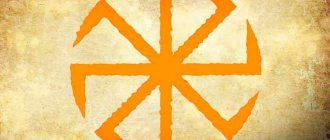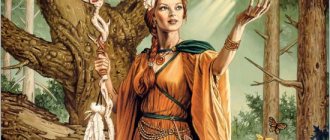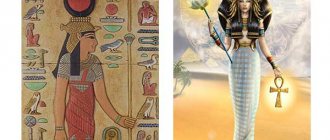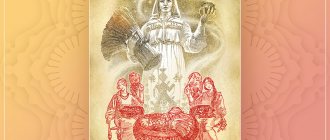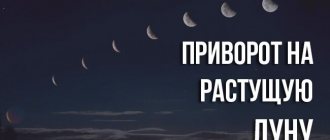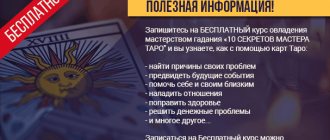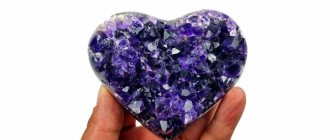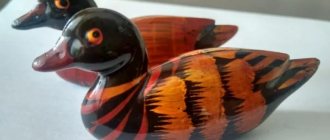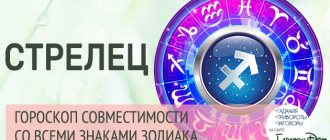Divia is the Slavic Moon Goddess, sister of Khors, the Sun God. Mention of the Goddess Divia is found in Christian treatises dedicated to the fight against the worship of ancient Gods. Such references indicate that the Goddess Divya has been revered since ancient times. The importance of Divya, the Moon Goddess, in the Slavic pantheon is also indicated by the wide distribution of Lunnitsa amulets associated with the power of the Moon Goddess.
Divya, the Moon Goddess, is most often approached by women. Divya is asked for girlish beauty and attractiveness, many beauty spells are read in the light of the moon, Those in the know turn to the Moon Goddess to develop intuition and prediction abilities.
Divya in the pantheon of Slavic Gods
The Slavic Moon Goddess Divia was created by the Creator Rod, just like her twin brother Khors, the God of the Solar Disc. Goddess Divya was created so that people could discern the light in the darkness. Unlike the sun, the moon shines with reflected light, but is still able to give people the opportunity to see what is hidden in the dark.
Divya, the Moon Goddess, protects people's sleep. In addition, the moon helps to keep track of time. It was the lunar month that became the first measure of time, and the Knowers even now in Slavic rituals are guided by the light of the moon.
The main functions of lunar deities in world mythology
We are accustomed to the fact that most often something shines from the sky for us, during the day it is the Sun, at night its reflected light pours on us from the mirror surface of the earth’s satellite - the Moon.
In various ethnic groups, the character of deities of lunar nature is associated with such functions as:
- symbolize light at night;
- connection with the animal world, with the subconscious;
- pregnancy and motherhood;
- giver of life-giving moisture, cleansing and granting immortality;
- cyclicality of time - through the constant repetition of the lunar cycle.
The zodiac sign ruled by the Moon is the cardinal water sign Cancer , its qualities describe all aspects of the world of the Moon god.
Lunar metal is silver.
The day of the week symbolically associated with lunar energies is Monday.
Number – 7 and 28, sometimes 30.
Food – milk and dairy products.
Zoomorphic images of lunar deities:
- cancer and crab (connection with the zodiac sign Cancer),
- owl (night bird, hunter),
- hare, rabbit (due to the similarity with the spasmodic movement of the Moon),
- cow (horns look like a moon, produces milk).
Legends and myths about the Slavic Goddess Divia
The goddess Divia rarely participates in Slavic myths, because every night she is busy - riding across the sky in her carriage, just as Khors, the Sun God, travels across the sky during the day.
Divya's chariot is driven by a pair of snow-white horses (in some legends, horses are black as night) or a pair of steep-horned bulls. Divya is similar in posture and movements to her brother Khors, but they do not manage to see each other: as soon as Divya’s carriage leaves the sky, Khors goes to rest and vice versa. True, sometimes the sun and moon still meet and we see them in the sky at the same time. Slavic myths say that this happens because Divya persuaded Dyya, the God of the Night Sky, to allow her to sometimes see her brother. Find out more about Goddess Divya:
Books of Slavic mythology
LiveInternetLiveInternet
Wednesday, August 08, 2021 01:36 + to quote book
Slavic Goddess Divia is our beautiful friend Luna. It is the manifestation of this Goddess that we see in our world in the form of either a thin sickle or a full circle. Goddess Divya-Luna is the embodiment of mystery, changeability and predictive power. This Goddess is the patroness of Fortune Tellers, Sorcerers, and all Knowers. In the obvious world, its influence extends to women, determining the rhythms of life. The Beautiful Goddess is the twin of God Khorsa, who, by the will of the Creator Rod, was given control of the night time. Every night the Moon Goddess rides into the sky on her white chariot and every morning she returns to herself, giving way to her brother in the sky. But, according to legend, she asked the Sky God Dy for permission to sometimes see her brother - so sometimes we see them meeting above our heads. Soft and calm, able to subtly sense changes around her, this Goddess most often becomes the patroness of women. However, Divya is the Patron Goddess and some of the men to whom she is close. Those who are favored by the Moon Goddess have developed intuition and often know how to develop their abilities for magic. Mention of the Goddess Divia is found in Christian treatises dedicated to the fight against the worship of ancient Gods. Such references indicate that the Goddess Divya has been revered since ancient times. The importance of Divya, the Moon Goddess, in the Slavic pantheon is also indicated by the wide distribution of Lunnitsa amulets associated with the power of the Moon Goddess. Divya, the Moon Goddess, is most often approached by women. Divya is asked for girlish beauty and attractiveness, many beauty spells are read in the light of the moon, Those in the know turn to the Moon Goddess to develop intuition and prediction abilities.
Divia in the pantheon of Slavic Gods The Slavic Moon Goddess Divia was created by the Creator Rod, just like her twin brother Horse, the God of the Solar Disc. Goddess Divya was created so that people could discern the light in the darkness. Unlike the sun, the moon shines with reflected light, but is still able to give people the opportunity to see what is hidden in the dark. Divya, the Moon Goddess, protects people's sleep. In addition, the Moon helps to keep track of time. It was the lunar month that became the first measure of time, and the Knowers even now in Slavic rituals are guided by the light of the moon. Legends and myths about the Slavic Goddess Divia The Goddess Divia rarely participates in Slavic myths, because every night she is busy - riding across the sky in her carriage, just as Horse, the Sun God, travels across the sky during the day. Divya's chariot is driven by a pair of snow-white horses (in some legends the horses are black as night) or a pair of steep-horned bulls. Divya is similar in posture and movements to her brother Khors, but they do not manage to see each other: as soon as Divya’s carriage leaves the sky, Khors goes to rest and vice versa. True, sometimes the meeting of the sun and the moon does happen, and we see them in the sky at the same time. Slavic myths say that this happens because Divya persuaded Dyya, the God of the Night Sky, to allow her to sometimes see her brother. The amulet is a symbol of the Goddess Divia The amulet of the Goddess Divia is the Lunnitsa. This amulet looks like a crescent moon, there are many varieties of it. Sometimes the horns of the crescent moon are directed downward, sometimes upward, there are round, closed moons that resemble the full moon, and even jewelry that depicts three moons at once (waxing, full and aging). The Lunnitsa amulet helps fortune tellers and Knowers; it is worn to develop clairvoyance abilities and intuition. In addition, Lunnitsa brings women happiness in love. The three-horned Moon, a talisman with crescent moons resembling a grape, brings quick conception and birth of healthy children. Attributes of the Goddess Divya Natural phenomenon - month, moon. Animal - horses. The bird is an owl. Metal – silver. Treba (offering) – ribbons, girl’s jewelry. Divia in the northern tradition of fortune telling and magic The symbol of the Goddess Divia is on one of the Slavic Rez Roda. Reza number - 7. The Reza of the Goddess Divya is ambiguous, it does not give a direct answer to the question, and its interpretation depends on the position of the moon in the sky during the reading. Reza of Goddess Divya advises balancing the internal and external. Therefore, during the waxing moon, this is advice to act more actively, and during the waning moon, the advice is to devote more time to reflection. In addition, Reza Diviya appears in a reading when the questioner has the opportunity to listen to intuition and understand something important. In addition, Reza Diviya appears in a reading when the questioner has the opportunity to listen to intuition and understand something important. Divya - Patron Goddess Moon Goddess Divya can be the patroness of both women and men. People who are close to Goddess Divya are drawn to everything beautiful and unusual. They have a refined perception of the world and trust their intuition. Often those who are close to the Slavic Moon Goddess are interested in magic, fortune telling, and try to develop their abilities for sorcery and creative people. Such a person can be vulnerable, his character is contradictory, his feelings are changeable. Periods of growth and activity give way to decline. But then revival always comes along with new ideas, openness to people, and optimism. Divya - Patron Goddess by similarity of character People whose patron is Goddess Divya are similar to her in character. Like the Moon Goddess, these people are sensitive to change. The moon shines paler than the sun; a more sensitive eye is needed to see objects in its light. At the same time, the Moon marks the change of day and night, as well as changes in the world - they are indicated by the waxing and waning of the moon. All these changes are subtly felt by those who are close to the Slavic Goddess Divia. Divya is the Patron Goddess of dreamy, romantic, vulnerable people, prone to creativity and sorcery, capable of appreciating the subtle beauty of silver moonlight. Goddess Divya is often close in character to women, but she can also become a patroness for men. After all, all people walk under the light of the moon, just as the sun shines for all of us. The Slavic Moon Goddess is close to you if you are a sensitive person who trusts your intuition. Most likely, you are interested in sorcery, because it is at night, in the moonlight, that the power of magic is felt especially well in the world. At the same time, you are a vulnerable person, sensitive to changes in emotions. Often Divya becomes the Patron Goddess of people who face constant mood swings. Such people are often unsure of themselves. They may come up with a beautiful, interesting idea, but have doubts about it. They are vulnerable, sensitive to other people's opinions. Sometimes bad thoughts completely prevent such a person from working or doing anything. However, a period of decline is always replaced by a rise, just as the moon in the sky first wanes, then waxes. Then the one who is close to the Slavic Moon Goddess again becomes a charming, cheerful and romantic dreamer, ready to try to perform a real miracle. The Patron Goddess Divya teaches such people to listen to their feelings, to balance their emotions and their actions. Words that describe the character of a person, if Divya is his Patron Goddess Dreamer, romantic, sensitive, rejection of criticism, charm, ability for sorcery, sophistication, humanity, modesty, disorganization and love of freedom. https://slavs.site/slavyanskie-bogi/ https://slavs.site/divija-boginya-pokrovitelnitsa/ https://slavs.site/divija/
Series of messages “Patron Gods of the Slavs”:
Part 1 - Who are the Slavic Patron Gods? Part 2 - Belobog - Patron God of the Slavs ... Part 7 - Horse - Patron God Part 8 - Kupala - Patron God of the Slavs Part 9 - Divya - Patron Goddess Part 10 - Chernobog - Patron God Part 11 - Kolyada - God Patron... Part 15 - Veles - Patron God of the Slavs Part 16 - Troyan - Patron God Part 17 - Svarog - Patron God of the Slavs
| Categories: | myths, legends, fairy tales/Northern tales Slavic symbols, runes Slavic mythology |
Tags:
Patron gods Divya
Cited 9 times Liked by: 5 users
Like share
0
Like
- 5
I liked the post - Quoted
- 0
Saved
- Add to quote book
- 0
Save to links
Liked5
0
Amulet - symbol of the Goddess Divia
Amulet of the Goddess Divia - Lunnitsa. This amulet looks like a crescent moon, there are many varieties of it. Sometimes the horns of the crescent moon are directed downward, sometimes upward, there are round, closed moons that resemble the full moon, and even jewelry that depicts three moons at once (waxing, full and aging).
The Lunnitsa amulet helps fortune tellers and Knowers; it is worn to develop clairvoyance abilities and intuition. In addition, Lunnitsa brings women happiness in love. The three-horned Moon, a talisman with crescent moons resembling a grape, brings quick conception and birth of healthy children.
Symbols and signs
The main symbol of Divya is the moon. It looks like a crescent moon, and the horns on the moons can be turned down or up, they mean a connection with the cosmos.
Sometimes the moon is completely round. Lunnitsa is a female sign, symbolizing flexible and soft female strength and power. The elements of the earth can be depicted on the lunars, as a symbol of the origin of life:
- stripes - rain;
- squares - earth;
- flowers – protection of a person by the Sun;
- crosses - the unity of the feminine and masculine principles.
Divya – Patron Goddess
Who are the Slavic Patron Gods?
The Moon Goddess Divya can be the patroness of both women and men. People who are close to Goddess Divya are drawn to everything beautiful and unusual. They have a refined perception of the world and trust their intuition. Often those who are close to the Slavic Moon Goddess are interested in magic, fortune telling, and try to develop their abilities for sorcery and creative people. Such a person can be vulnerable, his character is contradictory, his feelings are changeable. Periods of growth and activity give way to decline. But then revival always comes along with new ideas, openness to people, and optimism.
What are the amulets that give protection to Divya?
To know
The character of those who are close to the Slavic Goddess Divia has the following traits :
- romanticism;
- vulnerability;
- daydreaming;
- love of creativity and magic;
- disorganization.
Read more in the article “Diviya - Patron Goddess”
Lelya - goddess of Love
Lelya leads us along the path of knowing True Love. What is it and how does it differ from those feelings that in most cases a person mistakes for Love? True Love lies in seeing the divine in every living being, in the entire world around us. Each of us is a piece of the divine essence that fills the entire universe.
A person who is not able to see and love God in himself will not be able to love anyone in this world, because his heart is still closed. And all his relationships will be built on selfish expectations of the good only for himself as an individual.
Selfish love involves only self-love
. This is the feeling that comes from our Ego when a person thinks that he loves someone, but in fact all his “love” lasts exactly as long as he is loved. As soon as he ceases to receive the necessary care, respect and understanding, then all his “love” disappears, and it is replaced by hatred or indifference.
These conditionings disappear only in the light of True Love. The ego always demands self-love from the outside world and loves only those who give it this “feeling” of being loved and needed. This is a natural desire of a person, and he seeks love in the outside world, demanding from others, because he does not feel it in himself. After all, we are always needed and loved by God.
He is in each of us. But a closed heart is not sensitive, and an outward-directed mind does not have the clear perception of existence to see and comprehend it. Therefore, hatred and dividing, repulsive tendencies fill our world.
True Love is unconditional and does not demand anything from others.
. She shines above the world of forms, not attached to images, faces and exchanges. It is all-encompassing, not limited by anything, it is Great in its essence. It is difficult to describe in words, because it is beyond the limits of perception, thinking through the prism of the duality of existence.
Lelya is the power of pure love impulse. She opens hearts towards the eternal boundless light of Love and awakens a fire that ignites them with a sacred flame that cleanses them of the demands and selfish desires of the self.
But the selfish consciousness is not given the opportunity to comprehend its pure radiance. Love is hidden behind the faces, images and names of the limited world of forms, and the Ego is unable to see its majestic light in all its divine beauty.
While love for oneself as an individual is strong, the radiance of the eternal Light of True Love will not illuminate our Path, remaining a subtle light shining in the distance. Letting Love into your life means seeing it in yourself, and when the source of its eternal radiance is found, sharing this light with the whole world.
